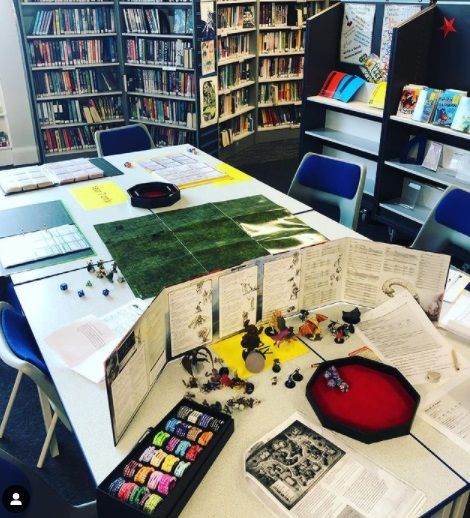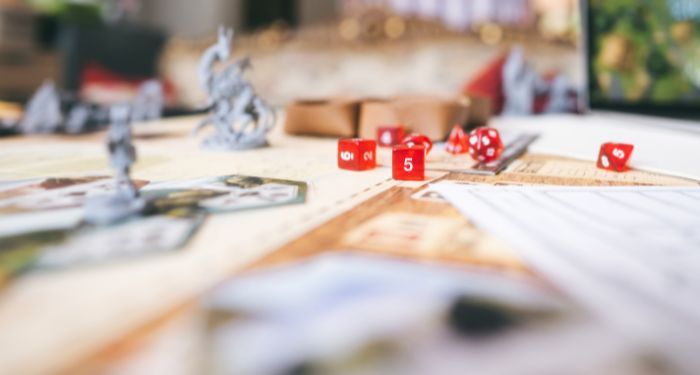I’ll start by saying that I am not a medical professional. I am an autistic school librarian who has discovered Dungeons and Dragons (D&D) as an amazing way to reach a lot of people, have fun, and create a safe place for youth — especially those who are neurodiverse. I can only speak for myself with this article, really, but I know Dungeons and Dragons is helpful to the neurodivergent community because I see it on a daily basis.
I was not diagnosed until my early 40s, and this came as both a shock and a sense of relief at the same time. It also made me feel very depressed, especially for the person that I was when I was young, who struggled a lot but never knew how to articulate it or make any sense of the world. I’ve been using Dungeons and Dragons in a school setting with ages 11-19 now for four years. The game started with just me and six students.
Now, we are running our own Dungeons and Dragons Conventions, and the students are play-testing campaigns that have yet to be published. D&D has infiltrated the entire school in an amazing way, and I could not be happier. I want to share here what the game means to me and how it can help the neurodivergent community based on what I have experienced.
It’s a Social Game
I have always struggled with social situations. This includes making eye contact, engaging in small talk (which I equate to a form of subtle torture), and generally feeling like I do not fit in. Not that you have to fit in, but for my entire life, I have always felt like I do not belong. As a very young kid, I would genuinely search my body for a button that would make me “normal” because I didn’t feel like I understood what the hell was going on, what I was supposed to be doing, and how to “act normal.” It felt like an alien spaceship had dropped me off and left me.
I was riddled with anxiety as a kid, so much so that I would be sick to my stomach from it. I would run away from school any chance that I got, and I became very good at faking illnesses. I did not attend grade six at all after the first few months of school; this is how much I hated social situations. D&D removes this anxiety for me because everyone has arrived for a very specific reason.
There are no social barriers to overcome or small talk to be had. D&D has created a sense of community that I have never been a part of. This is massive to me and a lot of other neurodiverse people who take part in this game.

Confidence
Relating back to the social anxiety I experienced as a kid, what it ended up doing, amongst many other things, is reducing my self-confidence to almost nothing. I felt like I couldn’t really function in the world, and I wasn’t wrong. I bounced around from job to job, and it was often a relief to be fired because it was like the employer saying out loud what we both knew: I wasn’t cut out for the job. I also suffered from zero confidence when it came to relationships. I could not understand how to speak to people in a way that was “normal,” and I still don’t.
I still avoid public places for the most part, and I do not enjoy speaking to people one-on-one. Has D&D “cured” this for me? Of course not, but what it has done is made me aware that I actually do possess a specific set of skills that can make other people happy. This is a big deal. It has allowed me to accept that I am a creative person and can create something that other people actually enjoy.
My experience as a D&D Dungeon Master has helped me find actual friends, even if I only speak to them online once a week. They are really the only friends I have, and that is fine with me because they are amazing people, and I am grateful they want to spend time with me.
Routine
Again, I do not speak for the entire neurodivergent community, but I personally rely heavily on routine, and D&D is all about routines. I can’t tell you how much of a relief it is to know that once, maybe twice a week, I know in my brain that I am going to have a lot of fun on a particular day and time. It has made a massive difference in my life.
It is scheduled fun or, as it is known in the medical community, behavioural activation. It can be truly beneficial to everyone, but it’s especially beneficial to me as someone who experiences dread and catastrophises on a daily basis. D&D flips this for me in many ways. I can always rely on the world of D&D as a source of comfort.
Dungeons and Dragons won’t be a fit for every neurodivergent person. However, for me, it has been a life-saver. It is a source of constant comfort and routine, an anxiety-killing machine that generates a ton of creativity.
